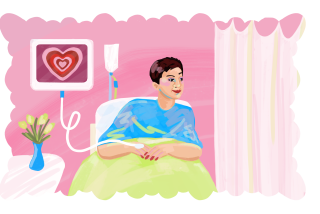In Practice: What Mr. 313 taught a future doctor
- Share via
A few years before I started medical school, I called the volunteer office at a New York City hospital. I imagined myself donning scrubs and handing clamps and scalpels to surgeons or organizing jars of pickled body parts for a pathologist.
Instead, I was assigned to the least exciting job in the entire volunteer department: helping the patient advocate’s office survey elderly patients about their hospital experiences.
I sulked down the hall, plotting how to get reassigned as quickly as possible. I figured I’d get a handful of surveys done that afternoon and then plead my case.
Room 313 was first. The old man lying in the bed by the window gave the faintest nod when I asked if he’d answer a few questions. He was bone-thin, with stringy gray hair, big sad eyes and a smattering of brown age spots on his face and arms.
I cleared my throat. “Please rank the hospital food on a scale from 1 to 5, with 5 being the best.”
A grunt.
I wasn’t sure how to respond. I’d always felt awkward around old people, even my great-aunts and great-uncles. The ones I knew were frail and kind. They commented on how much I’d grown and asked me what I liked to study in school. I had no idea how to ask them or start a conversation. Here, at least, I had a script.
But Mr. 313 had closed his eyes. He wasn’t taking the bait.
I longed for a different volunteering gig. Swabbing pus from a lanced boil in the emergency room, sweeping up toenail clippings in the podiatrist’s office — anything would be better than waiting for this ancient creature to spew forth a couple of numbers.
Maybe he couldn’t hear me very well. I raised my voice and asked him to rank the nursing care on the same scale.
He opened his eyes and tipped his head toward the window. A snort.
I took a step closer so I was right next to the foot of his bed. There was a faint urine smell. Loudly and slowly, I reread the question.
More snorts.
I studied the old man, wondering what had made him so thin and ill and unwilling to answer my simple questions. His hollow cheeks were dotted with gray bristle, and there was a package of adult-sized diapers on his bedside table. With a start, I put it all together.
The old man had dementia.
This man, I remember thinking with utter certainty, was a poster child (or poster elder) for the indignities of aging: the frailty, the confusion, death waiting in the wings. The old were a different species, blanched and fragile shells of long-forgotten lives.
Something in my expression gave me away, because the next thing I knew, Mr. 313 was staring at me hard, as if we were playing a childhood game to see who would blink first. Then, as if admitting defeat, he slowly lowered his gaze.
I felt a funny sensation in my chest, like the Grinch did when his heart grew three sizes. I sat down on the end of his bed.
And the old man started to talk. He told me he was born in Vienna and came here during the war. He revealed that he was married but rarely saw his wife — and that, he chuckled, was fine with him. He talked about the pain in his back that made walking difficult and the morphine that was “a joke.” He complained about the nurses, who never responded to his calls for help getting to the toilet until it was too late. He confided that in the last year he had lost what was most important to him: his privacy, and his testicles.
I sat there mesmerized, his stories swirling around me. Clearly he was not demented. I managed a “gee” or “golly” or shook my head when it felt right. I had no idea why he had back pain or why his testicles had been removed, but it didn’t seem to matter. He wasn’t looking for answers. He needed to talk.
I left his room exhilarated that a total stranger — and an old one at that — had been willing to share so much with me.
And just like that — although I wouldn’t realize it for years — the old man had taught me the essence of being a doctor:
Never assume anything about a patient until you’ve shut up, sat down and listened.
The patients I care for now, as a general internist, are the oldest of the old, men and women in their 80s and 90s. Wrinkles, dentures, bunions, broken hips — for me, these no longer portend inevitable loss and imminent death. Instead, I see potential. What matters, to paraphrase Adlai Stevenson, is not the years in one’s life but the life in one’s years.
Reisman is a general internist in Connecticut. She can be reached at anna.reisman@yale.edu.






